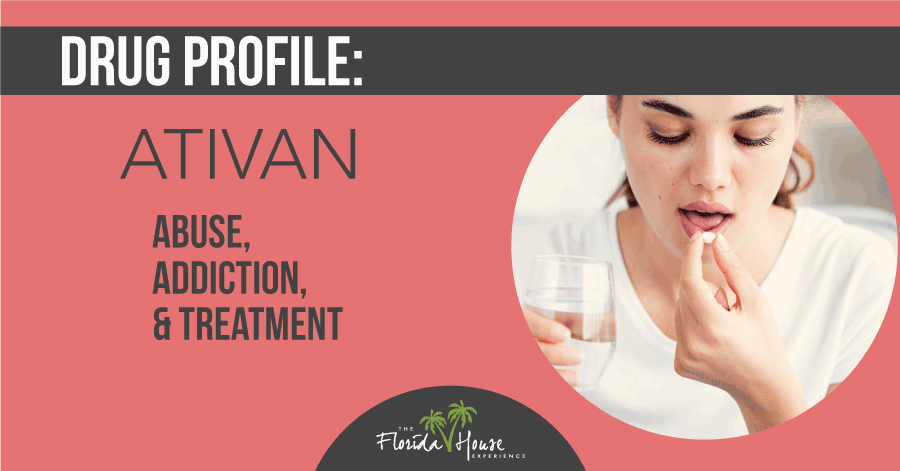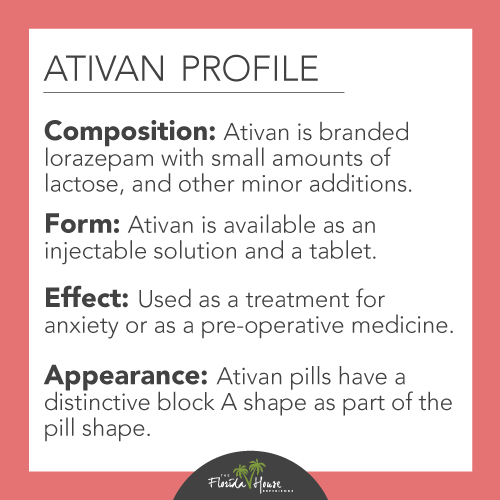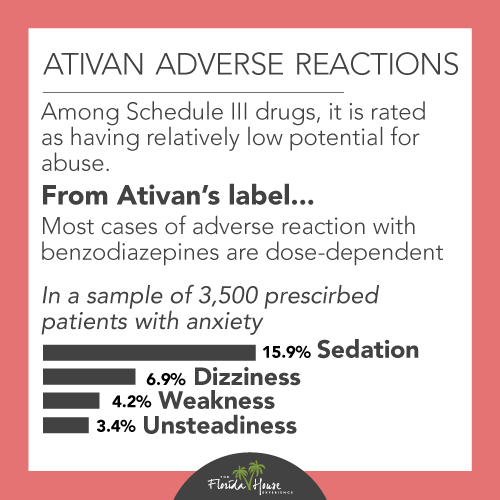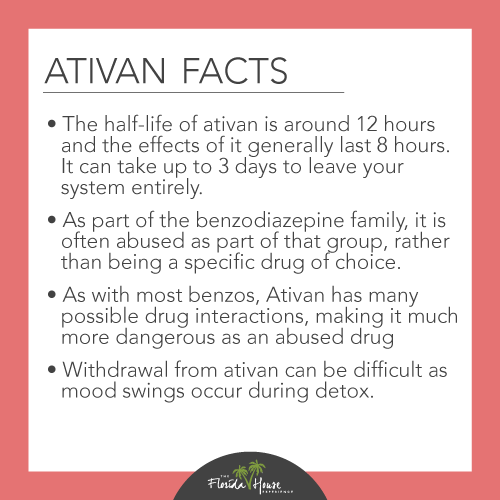
Ativan and other drugs like it can provide enormous relief to people suffering from anxiety and panic disorders. Unfortunately, Ativan also has a darker side, causing it to be part of a dangerous and sometimes even lethal group of substances.
Ativan is a brand-name drug containing lorazepam, which is a benzodiazepine prescribed commonly for people experiencing anxiety and less commonly as a way to prevent seizures and psychotic episodes like panic attacks.
Benzodiazepines, or “benzos,” have long been known for their potential to be abused. While Ativan abuse in the media is not as common as the abuse of some of the other benzos, notably Xanax, Ativan produces a similar high that causes it to be misused frequently.
Here’s everything you wanted to know about Ativan: what it is, how it’s used and abused and why addiction to it and many other drugs necessitates high-quality addiction treatment.
What Is Ativan?
 Ativan, as we briefly mentioned above, is a brand name for the drug lorazepam. Originally introduced by Wyeth Pharmaceuticals to the American market in 1977, Ativan was part of the family of drugs that became the most common way to treat conditions like depression and anxiety, replacing barbiturate sedatives for the same purpose.
Ativan, as we briefly mentioned above, is a brand name for the drug lorazepam. Originally introduced by Wyeth Pharmaceuticals to the American market in 1977, Ativan was part of the family of drugs that became the most common way to treat conditions like depression and anxiety, replacing barbiturate sedatives for the same purpose.
Benzos were initially introduced as safer, less addictive alternatives to the previous methods of managing anxiety and depression. Over the last few decades, we’ve learned that these claims turned out to be incorrect.
Uses of Ativan in Culture
Ativan isn’t often specifically mentioned when benzos are talked about in the news. This doesn’t mean lorazepam abuse isn’t happening, however. One high-profile case in which Ativan was a key factor? In 2015, a Germanwings co-pilot named Andreas Lubitz intentionally steered a passenger plane that he was flying into the French Alps, killing everyone aboard. Reports showed that he had lorazepam in his system which may have led to worsening depression and suicidal tendencies, resulting in the tragedy that followed.
Benzos as a family are becoming more and more worrisome as they relate to public health, with names like Chance the Rapper and singer Demi Lovato opening up about struggles with these drugs.
Alternative Names for Ativan
While street slang rarely specifies between Ativan and the other members of its family, common slang for benzos include:
- Downers
- Tranks
- Chill Pills
- Candy
Today, many pharmaceutical companies make a drug containing lorazepam. It is a small round disc that’s typically white in color. One of the most widely prescribed versions of the drug is Watson 240, produced and distributed by Watson Labs.
How Does Ativan Work?
 Benzodiazepines activate the GABA neurotransmitter in the brain, inhibiting the action of neurons that would otherwise cause anxiety, seizures and manic episodes. These drugs are so commonly prescribed because they work quickly, intended to provide instant relief to the group of symptoms they treat. Although different benzodiazepines vary in their effects, it’s believed that they all produce those effects by binding to and stimulating to the GABA a receptor.
Benzodiazepines activate the GABA neurotransmitter in the brain, inhibiting the action of neurons that would otherwise cause anxiety, seizures and manic episodes. These drugs are so commonly prescribed because they work quickly, intended to provide instant relief to the group of symptoms they treat. Although different benzodiazepines vary in their effects, it’s believed that they all produce those effects by binding to and stimulating to the GABA a receptor.
How Long Does Ativan Stay Active in Your System?
The half-life of Ativan is 12 hours, and effects of the drug typically last for around 8 hours, though it may take more or less time to wear off based on other factors unique to its user. On average, it can take up to 3 days for Ativan to leave your system entirely.
Ativan Addiction
Drugs are classified based on danger and addictive tendencies, according to the FDA’s Controlled Substance Act (1970). Ativan is a schedule IV controlled substance along with Xanax, Valium and Klonopin.
How is Ativan Abused?
 Ativan and other benzos are heavily prescribed by primary care doctors, who, while having the requisite training in general medicine, are often not familiar enough with the complexities of psychotherapy.
Ativan and other benzos are heavily prescribed by primary care doctors, who, while having the requisite training in general medicine, are often not familiar enough with the complexities of psychotherapy.
According to the National Institute on Drug Abuse (NIDA), prescriptions for Ativan and other benzodiazepine drugs increased by 67 percent between 1996 and 2013.
Commonly, Ativan and other benzos are abused on their own as a way to get high or dissociate from reality. High doses of sedatives can make people lose touch with reality and feel euphoric for several hours. Most often these drugs are taken orally, but snorting Ativan and other benzos is a practice that some believe may make the drug work faster than other methods.
Many abusers don’t have a drug of choice when it comes to benzos and will simply use the substances that are available to them. This is why it makes little sense to compare Ativan vs. Xanax or Ativan vs. Klonopin. Some benzo addicts have preferred drugs, but primarily, they all have the same effects.
While benzos are dangerous enough on their own when taken for a long time, they’re even more dangerous because they’re commonly abused in combination with other drugs.
For example, Ativan and opioid medications are a popular combination. The CDC reports that of all opioid overdose deaths, 30 percent also involve benzos. The gross numbers of both total overdose deaths and deaths involving benzos have seen a steady increase since 1999.
Ativan and alcohol is also a common mix. Studies have found that alcohol can actually increase the toxicities of benzos in the bloodstream.
Signs of Ativan Addiction
If you’re worried that a family member, friend or other loved one is addicted to Ativan or other benzos, there are some signs to look for.
It can be difficult to distinguish the early stages of addiction with someone simply needing the drug to be functional due to extreme anxiety or panic disorders. There is still a stigma on mental health disorders that makes users of anti-anxiety and antipsychotic medications feel the need to keep them hidden, even from friends and relatives. In some cases, a need can turn into an addiction, especially with highly addictive substances like benzos. Studies have found that Ativan can cause withdrawal symptoms after only 7 days of use.
Here are some indicators of a loved one’s addiction to Ativan:
- They lie, steal or hide their behavior to cover their use of the drug.
- They use Ativan without a prescription.
- You see them mixing Ativan with opioids, alcohol or other substances.
- They seem sleepy or out of it a large amount of time.
Treatment for Ativan Addiction
Addiction to Ativan and other benzodiazepines is becoming more and more common and must be treated as thoroughly as possible.
While withdrawal from benzos is not known to be as dangerous and uncomfortable as withdrawal from alcohol or opioids, it can still be challenging. Ativan withdrawal symptoms include:
- Worsening depression, anxiety and panic attacks
- Nausea and vomiting
- Fever
- Elevated pulse and blood pressure
- Headaches and dizziness
It’s recommended that detox from Ativan be done in a dedicated facility with constant clinical supervision for a few reasons:
- It’s difficult to successfully quit using any addictive substances without outside support.
- Because your brain isn’t used to functioning without these drugs, you may undergo severe depression and suicidal thoughts.
Using the Continuum of Care for Recovery From Ativan Addiction
At FHE Health, the rest of the treatment timeline for those addicted to Ativan is based on their personal needs. They’ll undergo counseling and personal exploration to provide the foundations for lasting recovery.
It can be especially difficult to navigate treatment for addiction when you’re addicted to a drug that you were initially or are still being prescribed. Here’s a little bit more information about undergoing treatment while using one or more prescription drugs for co-occurring disorders.
If you or a loved one find yourself addicted to Ativan or any other members of the benzodiazepine family, it’s important to get the help you need as quickly as possible. Contact FHE Health, and speak to us about your options for recovery.






